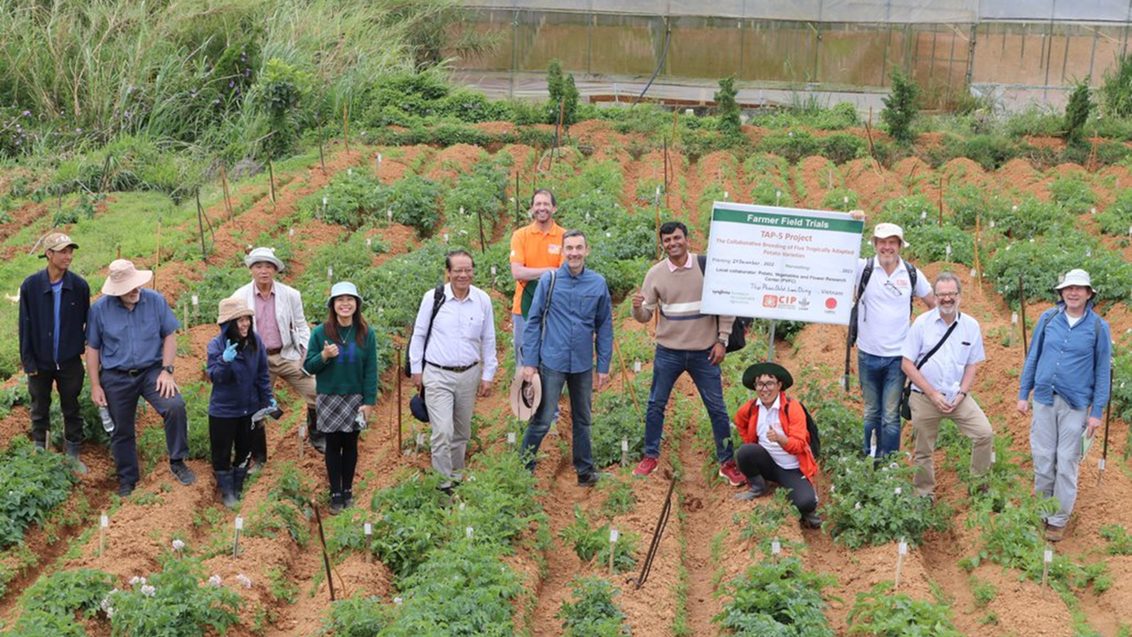Partners show their speed with a tropical spud

Integrated breeding gives Vietnam’s smallholders a promising potato
Potato growers in the tropics face many challenges. The TAP5 partnership tackles several at once. Fast work has already brought one variety to market. Others should follow soon – in Vietnam and beyond.
One of our Foundation’s public-private partnerships is devoted to collaborative breeding of five tropically adapted potato varieties. It is known as TAP5. The partnership has made remarkable progress. Traditional approaches take at least a decade to develop a new variety. TAP5 has succeeded in only eight years. In this regional program, Vietnam recently became the first country to approve the potato called HCIP210.
“This cream-fleshed variety shows high yield potential and wide adaptability”, says our Seeds2B Asia Head, Hervé Thieblemont. “It also shows strong resistance to late blight, and to important viruses.” In addition, HCIP210 can be stored much longer than the so-called ‘commercial checks’: key comparison varieties already on the market. Good storability helps ensure a reliable supply of ware potatoes for a long time after harvest.
Large-scale on-farm registration trials ran in six Vietnamese locations during 2021-23. “The results were good news all round for smallholders”, comments our local Technical Advisor Cuong Dao. “As well as much better yield, HCIP210’s disease-resistance enables farmers to save on crop protection products. The variety is also well adapted to cultivation in the central highlands. Smallholders there can grow HCIP210 during the off-season when other varieties struggle with the conditions.” Good off-season harvests should enable Vietnam to reduce its potato imports from China and other countries.
TAP5 is a partnership between the International Potato Center (CIP) and HZPC Holdings BV, a leading potato breeding and seed trading company. CIP has a long history of breeding tropically adapted varieties with early maturity and resistance to late blight and lowland tropical viruses. The material from HZPC brings resistance to several diseases, in suitable genetic backgrounds for both the fresh and processing markets.
Vietnamese partners include the Root and Tuber Crop Research and Development Center in Hai Duong and the Potato, Vegetables, and Flower Research Center in Da Lat. Overall support comes from USAID and our Foundation.
All the partners’ joint aim is to sustainably increase potato productivity and profitability, thus improving food security and smallholder incomes in Asia and Africa. TAP5 does this by developing and commercializing early maturing, climate-resilient, tropically adapted varieties for different growing environments and market segments.
Hervé Thieblemont
Taking an integrated approach, TAP5 blends new and conventional breeding techniques*. These include ‘shuttle breeding’, moving between the central highlands and lowland areas. For stringent selection of disease-resistant cultivars, TAP5 uses molecular markers at an early breeding stage, followed by parallel evaluation in several environments. Apical-rooted cutting enables rapid disease-free multiplication of the elite material in Vietnam.
TAP5 contributes to the International Treaty on Plant Genetic Resources for Food and Agriculture. Royalties from HZPC sales of the program’s varieties flow into CIP’s tropical breeding. TAP5 also addresses some new challenges to potato production. These include bacterial wilt caused by Ralstonia solanacearum. As well as in Vietnam, HPZC aims to test and sell promising TAP5 varieties in India, Bangladesh, Indonesia, Tanzania, Kenya, and Ethiopia.
*Sharma N, et al. A public-private partnership to speed up potato breeding. Open Agriculture. 2020 Dec 16;5(1):826-33.

